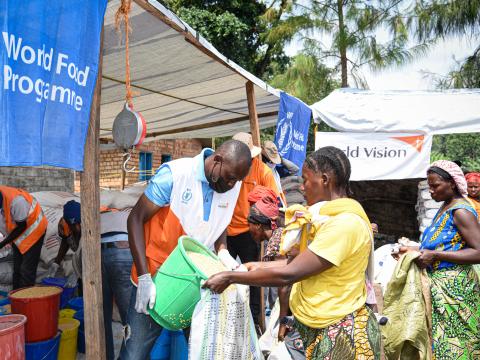DR Congo: After The Storm, Hope Is Reborn - How World Food Programme And World Vision Assistance Is Supporting The Survival Of Internally Displaced People (IDPS)

By Rodrigue Harakandi, Communications Officer
In the Minova region, South Kivu province in the east of the Democratic Republic of Congo, the World Food Programme (WFP) is teaming up with World Vision to provide vital aid to the many people displaced by the armed conflict, mainly in the Masisi territory. This partnership plays a crucial role in the fight against hunger and distress.
The situation of internally displaced people
Claude Kitumanini, food assistance coordinator at World Vision, describes the scale of the situation:
‘The Minova health zone has received more than 300,000 displaced people.
These people, fleeing the war, have found refuge far from their homes, particularly in the neighbouring territory of Kalehe in South Kivu. According to an OCHA report of September 2024, the majority of these displaced persons have settled in 63 schools, disrupting the education of almost 31,000 pupils’,he says.
Another challenge in the area is the inaccessibility of humanitarian aid.
‘Humanitarian access is becoming increasingly difficult in the area because the Minova-Goma road is impassable due to the hostilities, and the Minova-Bukavu road is dilapidated due to landslides’, he adds.
Curently, only the lake route is used, via Lake Kivu, to deliver food supplies and to deploy WFP and World Vision teams.
Testimonies of resilience
The stories of the people affected by this crisis reveal the resilience and hardship they have endured.
‘We fled the armed clashes in Sake and abandoned our village of Kimoka to find refuge here in Bugeri. We took nothing with us when we fled. My husband and I went our separate ways, and to this day we have never seen each other again. When we arrived, our biggest challenge was access to food. In total, three women, three men, and two children all died of hunger. Fortunately, the WFP and its partners intervened and are now helping us to overcome our hunger’, Fitina recalls with sadness the tragic losses.
This 70-year-old woman has endured a tough ordeal in her life. She has remained courageous despite the loss of other members of her family.
Without the intervention of the WFP and World Vision, Fitina, her family and others would have lost their lives. Today, Fitina is relieved that she can also benefit from food assistance and see her children spared from hunger and malnutrition.
The rations distributed consist of maize flour, peas, vegetable oil and salt. Together, World Vision and the WFP have committed to providing around 8,590 tonnes of food by the end of 2024, distributing around 200 tonnes of food each distribution day to reach this target.
A daily struggle for survival
Fitina recounts the impact of the crisis on her children's education:
‘My children had dreams for the future, but now we are struggling to survive first. Their education is no longer a priority. My prayer is that we wake up every morning alive, and I thank those who are supporting us in these difficult times, like the WFP and its partners.’
WFP and World Vision's commitment to vulnerable populations in the DRC is a beacon of hope during turmoil. Thanks to their joint action, thousands of lives have been preserved and a bright future is still possible. International cooperation and humanitarian commitment remain essential to overcome this crisis and restore dignity and hope to the displaced people.